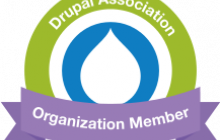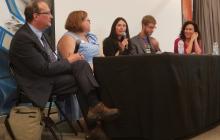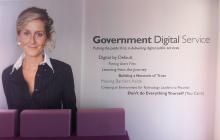Government
By Mike Gifford
on 06/06/2020
I had the pleasure of being interviewed by Richard Pietro as part of his Stories from the Open Gov podcast. Richard has gotten some amazing speakers on his show including Sir Nigel Shadbolt, Ashley Casovan, Nathaniel Heller, Melanie Robert, Rob Davidson, Tony Clement, Michael Geist, Lindsey Marchessault, Ryan Androsoff, Tracey Lauriault, Keith Loo, and Jesse Hirsh. You should subscribe to the podcast and listen to it on SoundCloud. We talk about a range of things here from accessibility to open government and open source, I hope you find it interesting.
I was encouraged by Ioanna Talasli ...
I had the pleasure of being interviewed by Richard Pietro as part of his Stories from the Open Gov podcast. Richard has gotten some amazing speakers on his show including Sir Nigel Shadbolt, Ashley Casovan, Nathaniel Heller, Melanie Robert, Rob Davidson, Tony Clement, Michael Geist, Lindsey Marchessault, Ryan Androsoff, Tracey Lauriault, Keith Loo, and Jesse Hirsh. You should subscribe to the podcast and listen to it on SoundCloud. We talk about a range of things here from accessibility to open government and open source, I hope you find it interesting.
I was encouraged by Ioanna Talasli ...
By Mike Gifford
on 01/11/2018


There are over a million Drupal sites on the internet. There is a huge range of organizations who use Drupal across all sectors of our economy. Unfortunately, when you look at Drupal.org you mostly see representation from the web industry. Web development shops, communications teams, and freelancers that make their living from building and customizing Drupal sites.
It’s not that it isn’t amazing to have 100,000 plus developers in an online community working to make Drupal meet their needs. It is.
But what we’re largely missing is those organizations that use Drupal to drive their enterprise,...
It’s not that it isn’t amazing to have 100,000 plus developers in an online community working to make Drupal meet their needs. It is.
But what we’re largely missing is those organizations that use Drupal to drive their enterprise,...
By Mike Gifford
on 16/10/2018


The Government of Canada (GC) hosted Open First Day on Friday, September 28. It was a really interesting opportunity for hundreds of people in public/private sector to get together and share their experiences.
I’d like to start by congratulating them on the title of the event. It wasn’t Consider Open Source Day or Learn about Open Source and Government Day. It Was Open First Day. Open Standards, Open Data, Open Source and Open Government.
The site for this conference was also forward thinking as it was all built on GitHub. More and more government microsites are hosted on GitHub...
I’d like to start by congratulating them on the title of the event. It wasn’t Consider Open Source Day or Learn about Open Source and Government Day. It Was Open First Day. Open Standards, Open Data, Open Source and Open Government.
The site for this conference was also forward thinking as it was all built on GitHub. More and more government microsites are hosted on GitHub...
By Mike Gifford
on 04/05/2018


There is a lot of excitement about AI (Artificial Intelligence). It shows promise to solve many problems, including some for greater digital inclusion. I see great potential, but also some significant limitations. We need a measured approach to machine intelligence to learn how algorithms can best help.
The Google Translate Problem
Let’s admit it. Google Translate is getting pretty good. However, it isn’t good enough to be as good as a professional translator. At some point, for some languages, we’ll probably get there. However, I still do not see a point that for legal documents that we...
The Google Translate Problem
Let’s admit it. Google Translate is getting pretty good. However, it isn’t good enough to be as good as a professional translator. At some point, for some languages, we’ll probably get there. However, I still do not see a point that for legal documents that we...
By Mike Gifford
on 12/06/2017


Originally posted on LinkedIN in two parts.
The Government of Canada’s Web Renewal Initiative has failed. It may not be public yet, but there really is no way to redeem this half-conceived initiative to centralize all government pages onto a single website - Canada.ca.
This goal was lifted from the UK Government’s Government Digital Services (GDS). The goal of the GDS team was no less than digital transformation. Our government appears to have mistaken the alpha.gov.uk site as the end goal, rather than a platform with which to experiment with new ideas in government usability. The GDS is...
The Government of Canada’s Web Renewal Initiative has failed. It may not be public yet, but there really is no way to redeem this half-conceived initiative to centralize all government pages onto a single website - Canada.ca.
This goal was lifted from the UK Government’s Government Digital Services (GDS). The goal of the GDS team was no less than digital transformation. Our government appears to have mistaken the alpha.gov.uk site as the end goal, rather than a platform with which to experiment with new ideas in government usability. The GDS is...
By Mike Gifford
on 09/10/2016
Recently I was asked if there were any products or services that would give users equivalent or greater accessibility than WCAG 2.0 Level AA. This is part of the feedback process for a report on web accessibility for state and local governments.
In addressing this I wanted to make it clear that, at the root accessibility is about eliminating barriers to communications. Tim Berners-Lee saw the potential for the web being a great equalizer as it could allow people to communicate in a way which was completely inclusive. In practice, the web has evolved to provide barriers to 10-20...
In addressing this I wanted to make it clear that, at the root accessibility is about eliminating barriers to communications. Tim Berners-Lee saw the potential for the web being a great equalizer as it could allow people to communicate in a way which was completely inclusive. In practice, the web has evolved to provide barriers to 10-20...
By Mike Gifford
on 05/02/2016


Open standards, open-source, open data, open government and open dialog. These are just some of the great benefits of the open web and why you should consider getting involved in the Open Source Initiative. It represents a real shift toward transparency that allows citizens to become engaged and can empower civil servants in their everyday work.
The Open Source Community
In Canada, the biggest success for open thinking was the Web Experience Toolkit. This project engaged existing open source projects like jQuery & Bootstrap to address the challenge of providing a multi-lingual, performant...
The Open Source Community
In Canada, the biggest success for open thinking was the Web Experience Toolkit. This project engaged existing open source projects like jQuery & Bootstrap to address the challenge of providing a multi-lingual, performant...
By Mike Gifford
on 07/01/2016
This article was initially posted on Dec 22nd, 2015 in the Hill Times.
If you have been on a federal government website in the past year, you may have noticed that it looks a bit different. Or you might not. The differences to the look and feel of the sites are a bit subtle for your average user. Almost all Canadians are unaware of the imminent plans to shift these sites to a proprietary content management system hosted in the US.
The move from having government sites hosted in Canada and supported by Canadians, to being managed in the USA by a huge American company should concern people....
If you have been on a federal government website in the past year, you may have noticed that it looks a bit different. Or you might not. The differences to the look and feel of the sites are a bit subtle for your average user. Almost all Canadians are unaware of the imminent plans to shift these sites to a proprietary content management system hosted in the US.
The move from having government sites hosted in Canada and supported by Canadians, to being managed in the USA by a huge American company should concern people....
By Chris Wright
on 02/09/2014


I had the opportunity to attend CodeFest 2014 in Ottawa. This two-day conference was a great chance for anyone who “works in the web” to get together, share their expertise and learn from their peers.
Background
Codefest is a free, volunteer-run conference centered around the Web Experience Toolkit (WET).
WET is an open source project led by the Government of Canada that is developed openly on GitHub. The focus of WET is to develop an innovative, user-centered web experience that can be widely deployed through an open and collaborative process of development.
Topical Chats and Technical...
Background
Codefest is a free, volunteer-run conference centered around the Web Experience Toolkit (WET).
WET is an open source project led by the Government of Canada that is developed openly on GitHub. The focus of WET is to develop an innovative, user-centered web experience that can be widely deployed through an open and collaborative process of development.
Topical Chats and Technical...
By Mike Gifford
on 16/04/2014
Back in 2007, Russell McOrmond, Phillip Smith and myself decided to set up a service for the Canadian NGO community to make it easier to match individuals with their elected officials. It seems like a pretty basic component of any effective democracy, but it still isn't something that is available to Canadians.
At the time, Statistics Canada offered a database of postal codes to riding associations. For $3000 you could buy a database on a CD and have the rights to buy updates every year. The license allowed us to resell access to the database through an API (Application Programming Interface...
At the time, Statistics Canada offered a database of postal codes to riding associations. For $3000 you could buy a database on a CD and have the rights to buy updates every year. The license allowed us to resell access to the database through an API (Application Programming Interface...
